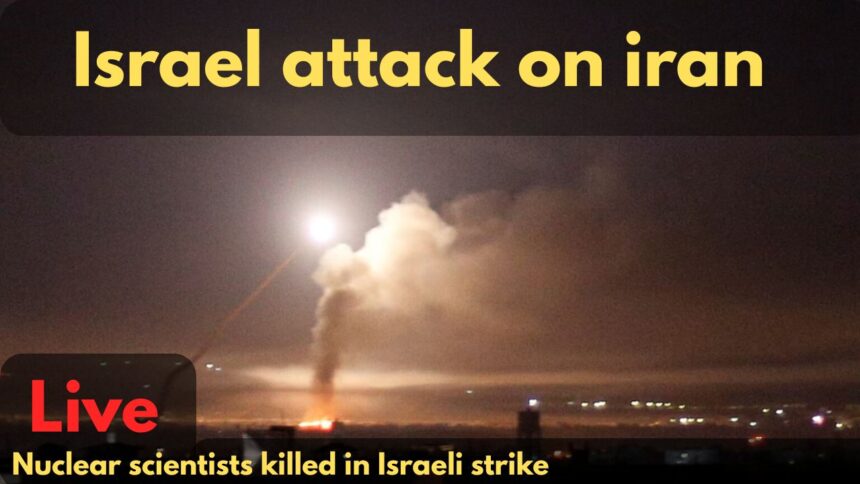Overview: Unprecedented Conflict Unfolds in the Middle East
Israel launches airstrikes on Iran in a dramatic escalation under Operation Rising Lion, targeting key nuclear facilities and military sites across the Islamic Republic. The Israel-Iran conflict reached a critical point early Friday as 200 Israeli fighter jets struck Iran, reportedly killing IRGC Commander Hossein Salami and six Iranian nuclear scientists. In response, Iran launched over 100 drones toward Israel and declared there would be “no limits” in its retaliation. The Middle East conflict escalates in 2025, triggering international concern, oil market volatility, and suspended Iran nuclear talks with the U.S.
Israel’s Motivation Behind Operation Rising Lion
According to the Israel Defense Forces (IDF), intelligence reports revealed that Iran’s nuclear program was nearing a “point of no return.” Officials cited concerns about Iran’s ability to rapidly enrich uranium to weapons-grade levels in decentralized, fortified underground facilities.
A senior IDF official stated:
“Recent intelligence shows Iran was dangerously close to having enough enriched uranium to build a nuclear bomb. We had no choice but to act decisively.”
High-Profile Casualties: IRGC Command and Nuclear Scientists Targeted
The operation resulted in the deaths of several top military and scientific personnel:
- Major General Hossein Salami, head of the IRGC
- Chief of Staff of the Iranian Armed Forces
- Commander of Iran’s Emergency Command
- Fereydoun Abbasi, former head of the Atomic Energy Organization
- Mohammad Mehdi Tehranchi, president of Islamic Azad University
- Four additional nuclear scientists whose identities have not been officially disclosed
This represents a severe blow to both Iran’s military leadership and its controversial nuclear program.
Iran’s Furious Response: Drones, Missiles, and Vows of Retaliation
In retaliation, Iran launched over 100 drones towards Israeli territory. The IDF confirmed that it had intercepted many of these drones outside Israeli airspace, but air raid sirens were heard across Jerusalem and central Israel, following a missile launch from Yemen. Explosions were also reported over Jerusalem due to interception activities.
Iran’s Supreme Leader Ayatollah Ali Khamenei declared:
“Israel must expect severe punishment for this crime. The regime crossed every red line and will face consequences without limits.
Iran has also suspended all air traffic and closed its airspace. Jordan and Iraq have followed suit, closing their airspace as a precautionary measure amid fears of further escalation.
Wider Regional Reaction: Jordan, Saudi Arabia, and the United Kingdom Respond
- Jordan announced it had intercepted several drones and missiles that violated its airspace and stated it would not be used as a battleground for regional conflict.
- Saudi Arabia strongly condemned Israel’s actions, accusing it of violating Iran’s sovereignty and breaching international law.
- The United Kingdom has stated it is not providing military support to Israel at the moment.
- U.S. officials clarified that they were not involved in the strikes, though diplomatic personnel were preemptively relocated from vulnerable areas.
Israel’s Internal Measures: State of Emergency Declared
Israeli Prime Minister Benjamin Netanyahu confirmed that the military operation would continue “for as many days as it takes” and declared a state of emergency across the country.
Israeli airlines including El Al, Israir, and Arkia have begun relocating aircraft to foreign destinations, and Tel Aviv’s Ben Gurion Airport has suspended all operations.
Defense Minister Israel Katz warned:
“A missile and drone attack against the civilian population is expected. We are prepared for all scenarios.”
Impact on Iran’s Nuclear Program and Global Oil Markets
Despite the heavy strikes on key facilities like Natanz — Iran’s central uranium enrichment site — Iranian authorities stated that no nuclear contamination had occurred. However, the damage to leadership and infrastructure is expected to delay nuclear advancements significantly.
Oil markets reacted sharply to the conflict:
- Brent crude spiked over 12%, crossing $77 per barrel
- West Texas Intermediate also surged, reflecting investor fears over regional instability
Energy analysts warn that further escalation could disrupt global oil supply chains and intensify inflationary pressures worldwide.
Collapse of Nuclear Diplomacy
The conflict has derailed ongoing nuclear negotiations. Iran officially withdrew from the upcoming round of nuclear talks with the U.S., originally scheduled for Sunday.
Iranian state media stated:
“After such blatant aggression, diplomatic engagement is off the table for the foreseeable future.”
Former U.S. President Donald Trump expressed hope that talks could still resume, stating, “Iran cannot have a nuclear bomb. We’ll see what happens next.”
Palestinian and Regional Militias React
- Hamas condemned the Israeli strikes and warned that they could “destabilize the region,” stating that “Iran is paying the price for standing with Palestine.”
- Missile launches from Yemen suggest other regional actors could become directly involved, raising fears of a wider war in the Middle East.
Key Developments Recap
- Israel launched over 200 fighter jets in a preemptive strike under Operation Rising Lion
- Iran lost multiple high-ranking military officers and nuclear scientists
- Iran launched a counteroffensive with over 100 drones and missiles
- Multiple airspaces (Iran, Iraq, Jordan) were shut down
- Global oil prices surged due to conflict-related fears
- Nuclear diplomacy between Iran and the West collapsed
- The Middle East faces its most dangerous escalation in years
Conclusion: A Region on the Brink
As of June 13, 2025, the Israel-Iran conflict marks a significant turning point in Middle Eastern geopolitics. With casualties on both sides, the breakdown of diplomacy, and increasing military mobilization, the situation continues to evolve rapidly.
While both nations prepare for further retaliation, the international community watches with deep concern, fearing that this could spiral into a broader, potentially uncontainable war.







